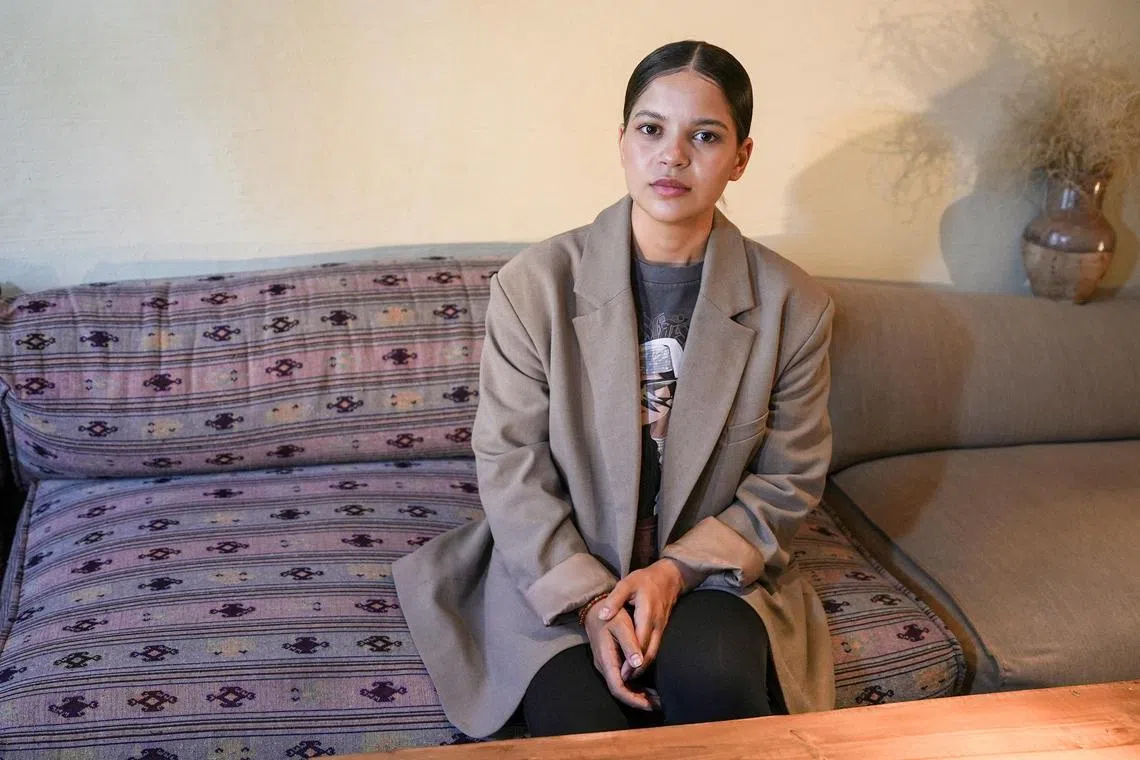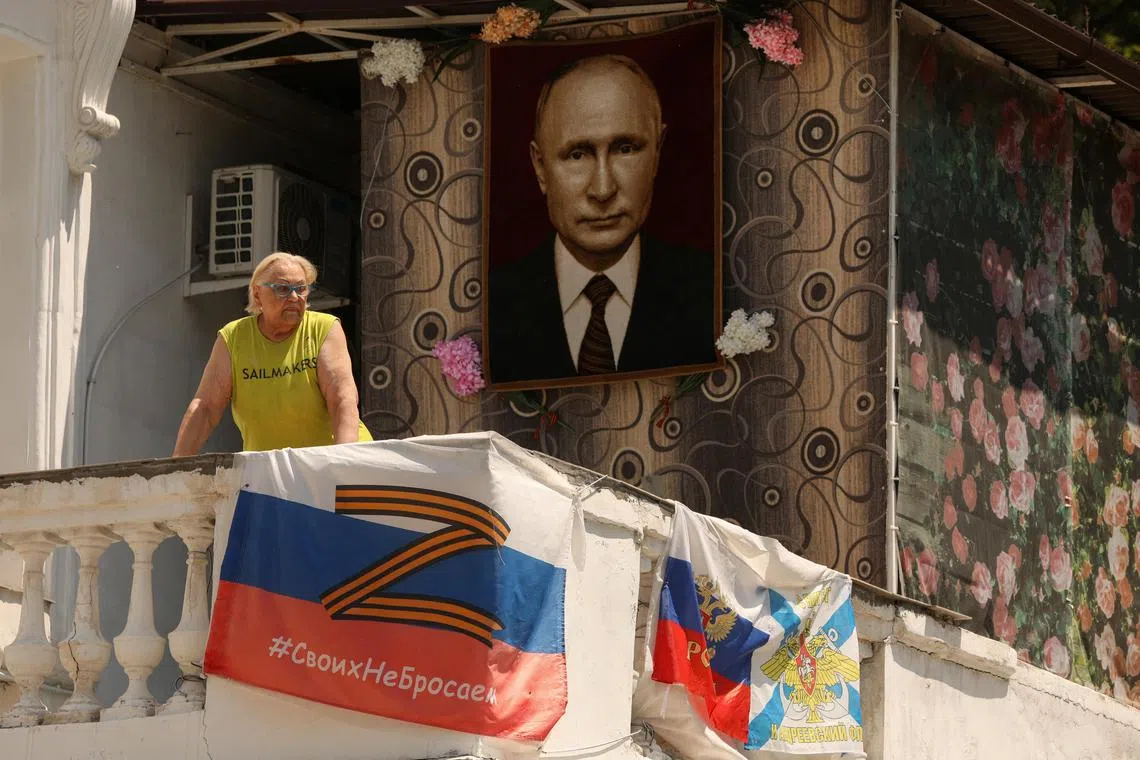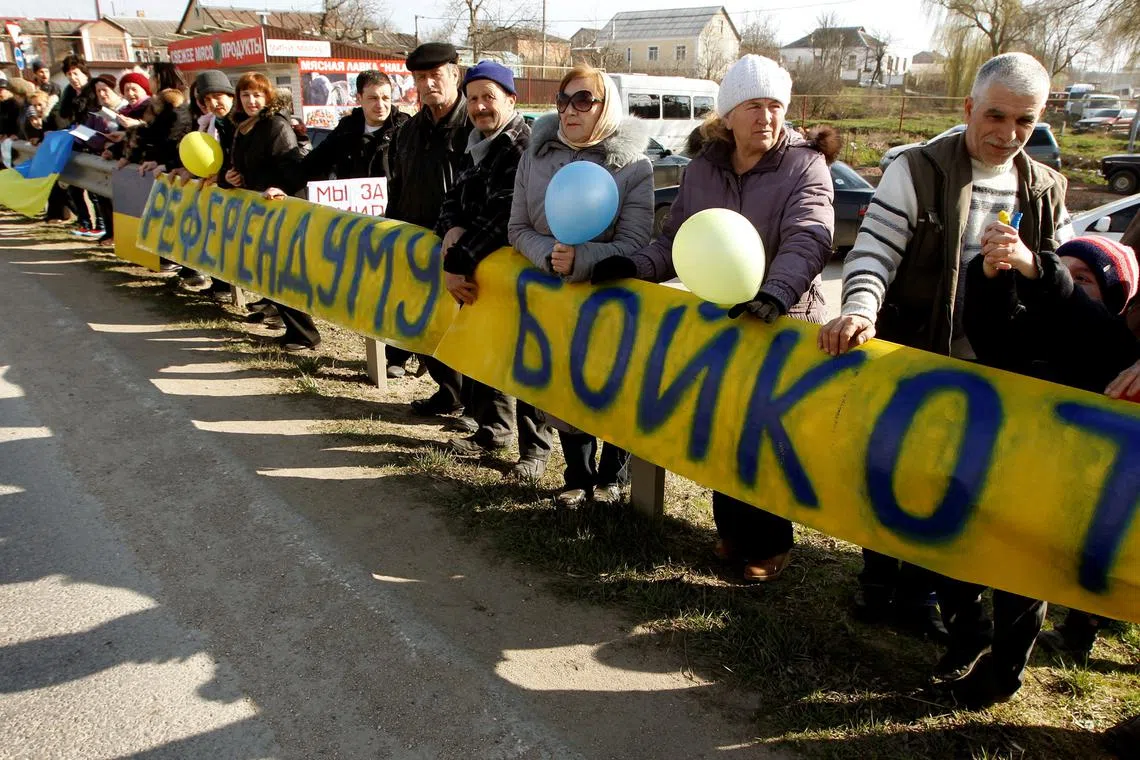Crimea’s Tatars, scarred by past, fear their homeland will be ceded to Russia in peace deal
Sign up now: Get ST's newsletters delivered to your inbox

Ethnic Crimean Tatar Leniie Umerova, 27, posing for a picture during an interview with Reuters, in Kyiv, Ukraine, on June 10.
PHOTO: REUTERS
- Leniie Umerova, a Crimean Tatar, was detained in Russia while visiting her father, enduring a near two-year ordeal involving a "carousel" of charges.
- Umerova's experience highlights generational trauma from Soviet deportations in 1944 and fears that Crimea could be recognised as Russian in a peace deal.
- Despite her suffering, Umerova hopes for a free Crimean Tatar community in Ukraine, while Zelensky cites her case against ceding territory to Russia.
AI generated
KYIV - When Ukrainian Leniie Umerova crossed into Russia on her way to see her ailing father in their native Crimea in late 2022, she was detained and forced to endure what she calls a “carousel” of charges and prison transfers that lasted nearly two years.
The ordeal, which included stints in solitary confinement, crystallised a sense of generational trauma for Ms Umerova, 27, a member of the Crimean Tatar community indigenous to the Black Sea peninsula that Russia invaded in 2014 and illegally annexed from Ukraine.
“It was very difficult because I was constantly alone in my cell and they (the Russians) periodically tried to feed me their propaganda,” said Ms Umerova, who initially faced administrative charges and later accusations of espionage, which she denied.
Ms Umerova had grown up listening to her grandmother’s stories of how in 1944 the family, along with hundreds of thousands of other Crimean Tatars, were deported to distant Central Asia on Soviet dictator Joseph Stalin’s orders for alleged collaboration with the Nazis, even though many Tatars including her great-grandfather were fighting for the Red Army.
Thousands died from disease or starvation, and the Tatars were only allowed back to Crimea in the 1980s.
Now, Ms Umerova fears that Crimea, as part of a final Ukraine peace deal, could be recognised as part of Russia - a scenario that the Trump administration in the United States has signalled is possible.
“For so many years now, the same enemy has been doing evil to our family,” Ms Umerova said.
“If we don’t fight now and overcome this, where are the guarantees that my children or my grandchildren won’t get the same (treatment)?”
Always before her is the example of her grandmother, who refused to speak Russian when Ms Umerova was young and immersed the family in Tatar culture and language.
“Whatever happens, we must return to Crimea,” was the message.
Ms Umerova returned to Kyiv after being released by Russia in a prisoner swop in September 2024, and despite her suffering, she remains hopeful that the Tatars, a Sunni Muslim, Turkic people, will one day be able to live freely again in a Ukrainian Crimea.
“Every day, every year... you live with the dream that now, now, now they will deal with this one thing and return Crimea... And so it will be, I am 100 per cent sure of this,” she added.
Russia won’t budge
But Russian President Vladimir Putin has insisted that any peace settlement for Ukraine must include recognition of Russian sovereignty over Crimea and four other Ukrainian regions.
Moscow denies Kyiv’s assertions that it is violating the rights of Tatars and other people in Crimea, which it says is historically Russian.

A woman looking from a balcony decorated with Russian flags and a portrait of Russian President Vladimir Putin, in Sevastopol, on Ukraine’s Russian-occupied peninsula of Crimea, on June 5.
PHOTO: REUTERS
According to the Ukrainian President’s Mission in the Autonomous Republic of Crimea, some 133 Crimean Tatars are currently illegally imprisoned by Russia.
Russia’s Foreign Ministry did not respond to a Reuters request for comment.
“To give (Crimea to Russia) is to simply spit in their faces,” Ms Umerova said of those detained Tatars and of the tens of thousands who continue to live in occupied Crimea.
Russia’s Foreign Ministry did not respond to a request for comment on this article.
At the time of Russia’s annexation, Crimean Tatars accounted for around 12 per cent of the peninsula’s population of some two million. They rejected Russia’s occupation and boycotted a referendum at the time, and community leaders estimate that some 50,000 have left since 2014, though most have remained there.

A 2014 photo shows Crimean Tatars holding a sign reading “referendum boycott” in the Crimean village of Eskisaray, outside Simferopol, Crimea.
PHOTO: REUTERS
Crimean Tatar rights activist and journalist Lutfiye Zudiyeva, who lives there, said Russia had subjected her community to what she called “active assimilation”.
“Of course, today in Crimea you can sing in Crimean Tatar and dance national dances, but the people have no political agency,” she said.
Crimea is internationally recognised as part of Ukraine by most countries but US President Donald Trump told Time magazine in April that “Crimea will stay with Russia”.
Under peace proposals prepared by Mr Trump’s envoy, Mr Steve Witkoff, the United States would extend de jure recognition of Moscow’s control of the peninsula. However, the two sides have made little progress in peace talks since April.
Ukrainian President Volodymyr Zelensky is trying to resist Mr Trump’s pressure to cede territory to Russia
For Ukrainian singer Jamala, who won the Eurovision Song Contest in 2016 with her song “1944”, about Stalin’s deportations, any talk of legally recognising Crimea as Russian is “insane”.
“If a country like America says ‘it’s no big deal, let’s just forget about it and move on’, then there are no guarantees in the world,” Jamala told Reuters. REUTERS


